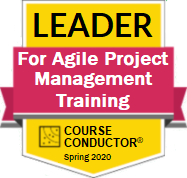Agile project management course and Agile methodologies
An Agile project management course helps learners develop Agile project management skills. Agile methodologies, including Scrum, Kanban, and Lean, are core to Agile project management courses. Each Agile project management course, including the Agile coaching course and Agile development course, provides practical Agile project management training. These Agile project management classes use interactive online courses and virtual classroom environments. Agile project managers learn project management techniques, Agile project delivery, and Agile project management principles.
Agile project management courses
Agile project management training is offered through Agile project management programmes. These Agile project management courses prepare candidates for examinations and certification exams. Certification is important for managers, product owners, and those seeking advanced diplomas or diplomas. Learners on Agile project management courses learn about Agile project management tools for project planning, user stories, and risk management. Agile management courses provide governance, leadership, and communication skills.
Agile project management course curriculum and frameworks
The Agile project management course curriculum includes lectures, tutorials, and practical sessions with tutors and trainers. Agile software development, automation, and digital badge achievements are covered. Agile project management courses align with frameworks like PRINCE2, DSDM Atern, and Azure DevOps. Organisations use Agile management to deliver value, improve performance, and achieve objectives. Project management institute and coursera offer online Agile project management courses.
Programme management, workshops, and Agile project management skills
Agile project management course participants earn certifications, learn Agile approaches, and study programme management. APM Group, PMI, and Agile Business Consortium provide recognised Agile project management credentials. Agile project management workshops, project management workshops, and project training are included. Project managers use Agile project management tools in real project environments. Students experience Agile project management classes and project management certification processes.
Online training and Agile project management course content
Agile project management online training allows flexibility and access to a virtual classroom. Agile project management course candidates prepare for Agile project management exams and develop practical Agile project management skills. Agile methods courses and Agile methodology courses enhance knowledge of Agile approaches. These Agile project management courses are suitable for all project managers, business analysts, and leaders. Agile project management course content supports both Foundation and Practitioner certification. Learners gain knowledge, experience, and certification to become successful project managers.
What are the main parts of an Agile project management course?
How does an Agile project management course improve project management skills?
What will you gain from Agile project management certification?
How do Agile methods change project delivery processes?
Why study Agile project management online?
What are the advantages of Agile project management training?
What is Agile project management?
How does Agile improve delivery and support business agility?
What Agile principles adapt to support different teams?
How do Agile tools increase efficiency and teamwork?
What skills do Agile project management courses cover, including Scrum basics?
Why choose Agile coaching to become a change agent?
What are the top Agile methods like Kanban and SAFe?
How are Agile project management courses different from traditional ones?
What are the certification benefits in today’s digital era?
How can Agile project management training boost your career value?
What are the best online Agile project management courses for remote learning?
How do Agile workshops support skill and change development?
Why are Agile project management techniques vital for business?
How do Agile project management classes support learning and Agile mindsets?
What tools are essential for Agile, like Jira?
How does Agile project management training prepare you for real challenges?
Which Agile techniques improve project delivery in the course?
How can Agile project management courses boost team cooperation and agility?
How do Agile principles drive project success and governance?
How do online Agile project management courses support remote, flexible learning?
What are the main elements of Agile project management training?
Agile Project Management Course Overview
The Agile project management course provides a comprehensive introduction to Agile methodology, frameworks, and certification, improving competence across industries. This Agile project management course empowers learners to master adaptive planning, stakeholder alignment, and measurable delivery outcomes.
Who Should Attend an Agile project management course?
This Agile project management course suits project managers, Scrum Masters, product owners, and delivery leads seeking structured training in Agile frameworks. Participants discover how to apply Agile practices to software, engineering, and business projects with real-world relevance.
What You Will Learn on an Agile project management course
Through the Agile project management course, students learn iterative planning, backlog refinement, sprint execution, and release coordination. Lessons integrate Lean software development, DevOps pipelines, and Agile coaching techniques to reinforce continuous improvement.
Agile project management course Structure And Modules
The Agile project management course follows a structured design combining theory and hands-on modules. Learners progress through practical exercises and assessments aligned with professional standards and educational technology best practice.
Agile project management course Module Breakdown
Each module in the Agile project management course explores estimation, collaboration, lifecycle management, and hybrid governance. Participants gain confidence in stakeholder communication and empirical measurement.
Agile project management course Assessment And Certification
Assessments evaluate understanding through applied case studies and performance metrics. Certification validates knowledge gained from the Agile project management course and enhances professional recognition globally.
Practical Agile Techniques And Tools
Practical workshops in the Agile project management course feature Scrum ceremonies, sprint boards, and Agile backlog management. Trainees experience digital transformation case studies using recognised Agile frameworks.
Tools And Tooling Support
Students practise with collaboration tools like Jira, Trello, Azure DevOps, and Miro to enhance transparency and communication in Agile project management. Each session reinforces practical skills for distributed and hybrid teams.
Scaling Agile
Scaling methods covered in the Agile project management course include SAFe, LeSS, and Disciplined Agile Delivery. Learners analyse synchronisation, dependency management, and multi-team coordination across value streams.
Tool Integration Examples
Examples show integration between version control, automated testing, and continuous delivery pipelines. These reinforce how the Agile project management course connects technical excellence with effective management practices.
Career Outcomes And Further Learning
Completing the Agile project management course builds career-ready skills for Agile coaching, programme delivery, and leadership roles. Graduates demonstrate a strong understanding of transformation management and continuous learning.
Certification Pathways?
The Agile project management course outlines multiple certification options, from foundation to practitioner levels. Selecting the right credential depends on prior experience and career direction.
Next Steps After The Agile project management course
After finishing the Agile project management course, professionals can join Agile communities, continue formal education, and apply new principles within real-world projects. Lifelong learning ensures ongoing advancement.
Practical Examples And Case Studies
Case studies illustrate how the Agile project management course supports business transformation, innovation, and stakeholder collaboration. Each example demonstrates measurable improvement through empirical analysis.
Real-World Scenarios
Scenarios include digital launches, organisational redesign, and technology migrations where Agile project management methods delivered tangible success.
Measuring Success
Metrics discussed in the Agile project management course include throughput, velocity, and stakeholder satisfaction. Continuous improvement cycles ensure teams sustain progress and maturity.
Learning Resources And References
Learning materials accompanying the Agile project management course feature research papers, e-learning modules, and curated multimedia resources. Learners explore leadership, systems thinking, and adaptive strategy for modern enterprises.
Further Reading
Recommended reading expands knowledge beyond the Agile project management course, covering retrospectives, collaboration, and innovation culture in high-performing teams.
Extending Knowledge Through Practice
Applying Agile project management course concepts in real workplaces ensures lasting proficiency. Learners document lessons learned, run reflection cycles, and engage in continuous feedback loops for growth.
Peer Collaboration
Peer learning forms a vital component of the Agile project management course, encouraging teamwork, diversity of thought, and shared problem-solving across disciplines.
Continuous Improvement
Kaizen, root cause analysis, and adaptive leadership techniques feature in the Agile project management course to foster professional maturity and self-assessment.
Reflective Exercises
Reflection tasks challenge participants to evaluate leadership approaches, decision-making strategies, and collaborative behaviour using evidence-based methods.





